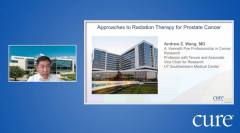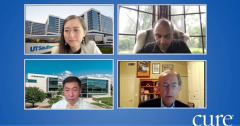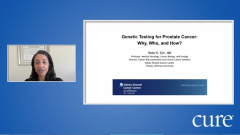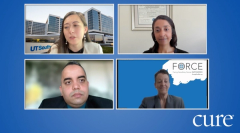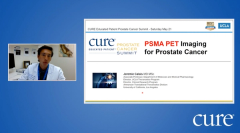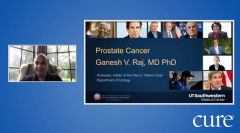
Educated Patient® Prostate Cancer Summit Looking Ahead Panel: May 21, 2022
Watch Dr. Jeremie Calais, Dr. Tian Zhang, Dr. Landon C. Brown and Jim Rosenfield answer questions about novel agents and strategies during the CURE Educated Patient Prostate Cancer Summit.
Episodes in this series

This panel was moderated by Kristie L. Kahl and featured Dr. Jeremie Calais, Dr. Tian Zhang, Dr. Landon C. Brown and Jim Rosenfield.
Kahl: So Jim, I want to start with you. Can you just briefly tell us about your journey and then in particular, I know you had mentioned to me before that you underwent the experimental PSMA imaging as well.
Rosenfield: Yeah, sounds good. The (type of) cancer I represent was not on Dr. Brown's list, and will be added to the next one. I find it has been very helpful as have the other resources. I wanted to put a human face on the talks today, the excellent talks of all the panelists, we've dealt with the discussion before this session, and try and tie my own story into what you've heard all day, and put a human face on it.
I skipped stages 1, 2 and 3, and went right to 4. Of course, I didn't really but I was diagnosed, I was already stage 4 diagnosed because of bone pain. And so my Gleason score was a 9. And we already knew I had prostate cancer before I had the biopsy. So it was kind of backwards. I then started in a clinical trial. Dr. Brown recommended clinical trials I went to NIH, was put on a clinical trial and I was put on docetaxel and an experimental drug, which in this case was pressed back. The trial didn't work. But it helped me. So I'm grateful. But overall, the trial did not find that combination improved effectiveness of treatment, or the docetaxel alone, the prospect didn't seem to do anything. So many of my patients have not done well, here about a dozen of us research panel that have done well. And we're being staged to see why my cancer is still hormone sensitive.
And I can say that I am on ADT which Dr. Brown talked about quite a bit. I hate it. But it's kept me alive. So I love it. And so it is a love-hate relationship. Almost every side effect he named I have them. I don't like them. I don't think I've lost mental acuity. But maybe I've lost enough mental acuity…but I have all the other side of bone loss… I have hot flashes almost every night, I lost a lot of muscle mass. And, and so on. And so it's something you have to do. But I don't like it.
I had three PET scans experimentally because NIH can do that. PSMA was one but it was the third one. The first two were axumin and the other was floradix. And the idea was that they are going to see if PET scans searched out sugars or the search stuff metastases and bones were better than regular bone scan. In my case, they weren't. But the PSMA study is the only one that actually saw my original tumor in the prostate. And that being said, none of the studies found the bone metastasis that had been seen previously. So we were really pleased with that. And the doctor stopped the ADT, because he was going to refer me for CyberKnife which I have completed. And I'll probably go back on ADT, but I'm not producing any testosterone anyway. So it wasn't in terms of, quote unquote, holiday, it's no holiday because none of the symptoms caused by ADT went away. And so that would basically be my summary. And I open up to questions if people have any.
Kahl: Great, thank you for sharing your story. So Dr. Zhang, we had a question come in earlier. So a patient had read that, you know, years ago, 70% of those with stage 4 disease probably died within four to five years. But I know with these newer therapies, when drugs stop working, I feel like those numbers have probably gone up. So can you maybe address the state of where we're at with prognoses now with stage 4 disease?
Zhang: I'm sure you know, It's a hard question to tackle and it really depends on each person's case. But there are now many treatment options for both metastatic hormone-sensitive prostate cancer as well as in the castration-resistant setting. And, you know, when we're looking at incremental increases with each treatment, they are, you know, somewhat incremental for that particular population. But over the grand scheme of things, we can be improving overall survival for many of our patients with all of these treatments when used in sequence. And so I never like to give prognoses in clinic. And it's very hard to do that. But, you know, I do encourage our patients that if we use these treatments in sequence and their tumor response, then we can very well be getting them to live multiple years, even with metastatic disease.
Kahl: Absolutely. And Dr. Calais do you do PSMA PET before surgery? And if we don't, why not?
Calais: Hello, everyone. Very beautiful to be here and see you in the Zoom Room. All the questions. And I agree with them we learned a lot from that's the best way to do so to answer your question.
So not in every patient you know, you do placement PET scan performs the best in untreated disease, when you have high risk of metastasis for the analysis of the prostate cancer extension within the prostate, it works decently well. But the modality of reference remains MRI, that has more spatial resolution to assess where is the extension or not. So you really have to be classified as unfavorable intermediate risk or high risk or very high risk, then you would benefit from a placement test to rule out disease outside of the prostate, which will of course, obviously impact the surgical planning. But if it's low risk, if it is favorable intermediate risk, there is not that much need to do this method scan because the likelihood of having disease outside of the prostate is low.
Kahl: Okay, great. And Dr. Brown, we have someone ask if you could maybe expand on estrogen patches for ADT.
Brown: Um, so that's a good question. I wouldn't in terms of, I assume we're meaning in terms of hot flash side effects. I wouldn't say that's a common approach because I think that you know, the goals of ADT are hormone lowering. And estrogen itself is a hormone as well and there is some overlap, there are some estrogen-based treatments that can improve hot flashes. But it is not a common part of my practice to prescribe those,
Kahl: And Dr. Zhang is PARP ever used to prevent metastatic disease or is it only after a disease has progressed to metastatic?
Zhang: It's a good question. I think these PARP inhibitors are making their splash. Certainly in these very advanced settings. There are currently ongoing trials to test PARP inhibitors in localized settings. But not in a preventative fashion, just quite yet. So only time will tell if they're actually going to be helpful for a portion of patients even in the localized setting.
Kahl: Great, thank you. And Jim, I want to jump back to you. So I know when you and I had a call before we even jumped on the summit. And you had mentioned that when you were kind of going through the motions and learning more that there were some myths around PSMA that you've heard like the idea of injecting radiation and people not understanding what it is. Can you talk a little bit more about the myths that you kind of heard and how you dispelled them?
Rosenfield: Yeah, the main one is the fear of radiation. But I feel that even though radiation can be harmful, I had it. I've had it numerous times in terms of different scans over the four years that I've been studied. I think the benefits outweigh any risks you've already got to me and may sound cold, but you've already got metastatic disease. So you know what, what's the big deal and I tell people that if they're fearful, most patients really view this as with hope and they want it. There is a lot of problems around insurance coverage. But most patients that I talked to, they do want the PSMA scan and if you have patients that are veterans, they can get it for free but they have to travel to California to do it. And the VA does not pay for it. But the VA in Westwood will give them a PSMA scan, if people want it in insurance won't cover it.
Kahl: Great, thank you. And since we're kind of talking about these novel agents, Dr. Zhang, you know, one thing that we talk to our patients a lot about is clinical trials and kind of how we just dispelled the myths with Jim here. Can you talk a little bit more about clinical trial myths, and maybe some ways we can try to help patients understand that, you know, they're not going to be experimented on, and they don't just get placebo and things like that?
Zhang: Sure. This came up, actually, yesterday in one of my patient conversations. And so, you know, when we're thinking about trials, often we're building on prior knowledge. So when, even in a randomized trial, as you have heard, throughout the day, today, many of our trials are built on adding to standard-of-care treatment, or comparing two standard-of-care treatments. And so in this time, our phase 3 trials, we're really trying to improve upon what we already know. And so many of these trials are not benchmarked against placebo. And no, that is a myth that many patients are afraid of, you know, getting a sugar pill. And it's really trying to see how much more we can add to any standard-of-care treatment.
The other thought about clinical trials is that, you know, in terms of thinking through experimental cohorts, when patients are on clinical trials, they do actually get a little bit more attention, actually, lots more data collected about them. And, and we access different parts of a cancer center where there's research teams that are looking in on their care. So sometimes they can actually get a little bit easier access to their health care team. So I think of trials as really trying to build on what we know already. And if they have access to a trial that makes sense for them, they can certainly sign up for whatever trial is being offered. Now, everybody has to tailor that to their own individual situation. But certainly, it should be part of a discussion of what trials are available for me.
Rosenfield: If I can answer that they did. For me. There's the feeling that initially, I didn't know if I lived this long, and it didn't expect to buy frankly. And so for me being in a clinical trial was contributing knowledge that would help other patients. And so if I failed, which most of the people in my study, I have not succeeded, that I failed, in some way, in a novel way to help others. So I feel there's a strong contribution factor that my death is at least has meaning, because I contributed to knowledge that made up those behind me.
Kahl: Absolutely. Thank you for that, Jim. Dr. Zhang, did you have something to add to that?
Zhang: And you know, that's so powerful of the contributing to others and the knowledge of the field, even in a standard-of-care cohort, the lutetium trial, I didn't mention, but in the midst of the trial implementation, they had trouble getting patients to stay on the standard-of-care treatment. And it isn't an important part of our trials is to make sure that whatever treatment is assigned that patient’s actually go through with that otherwise, we won't actually understand what benefit our new treatments have, compared to what standard of care. So it is an incredibly generous and important aspect of patients when they provide the consent and participate on our trials. And I'm always very grateful when patients sign up to be part of trials.
Kahl: Absolutely. Dr. Brown, we had another question regarding testosterone levels and reducing PSA. Should one refrain altogether from sexual activity, would that help at all?
Brown: That's a good question. If someone will, it depends on the setting of their disease and what treatments are on but if someone is on ADT and their testosterone level is low, then there is no recommendation to refrain from sexual activity with those testosterone levels already being low, nor is there really a concern and other settings to refrain from sexual activity specifically for testosterone levels.
Kahl: Great question. And Dr. Calais, I think you've kind of touched on this earlier with the PSA before surgery, but if a PSMA scan does come back positive, how do you determine the consideration for either receiving proton beam radiation or castration?
Calais: That will be so as a nuclear medicine physician that reach the scan basically, in that setting, when we're not giving the radionuclide therapy, we just say to the referring physician, which can be the surgeon, which can be the radiation colleges, or which can be the medical oncologists, basically what we see, and where is the disease with the most sensitive technique we have available now. And then based on that, of course, the decision under the same if the disease is confined to the prostate, if it's involved in Node 123 lot, if it's disease outside of the pelvis in the bone or other nodes, and how many they are. So this would be a decision that radiation oncologists, medical oncologists and surgeons will take together. And the patient at the end will have the final word, getting all the treatment plans, what I observe often is that they have multiple options, and at the end, the patient choose. And that's what we observe a lot. But of course, seeing more disease earlier, enables can have more pillowed approached, and it changes reviewed the prior treatment plans that was given before this instance.
Kahl: Absolutely. So we only have a few minutes left, I want to close out the day with just some final thoughts. And you know, I think we heard a lot of interesting information today and with this last session on novel agents, and where we're going forward in the future. So just parting thoughts on what you hope patients can kind of take away. So Jim, I'll start with you.
Rosenfield: The key thing for me is that diagnosis of prostate cancer is not a death sentence. It's not the Casper, the ghost friendly cancer that a lot of people mistakenly feel it is. But it isn't a death sentence. And people should be encouraged to live their lives to the fullest and enjoy what they can enjoy while they can enjoy it. And so many people just get depressed and just give up, that doesn't help. I think mental attitude makes a lot towards finding this.
Kahl: And Dr. Brown, I'll shift over to you.
Brown: Yeah, thanks again, for having me. Um, I guess I would just echo with the discussion we had earlier about clinical trials. And I think encouraging folks to participate if it's right for them and talking with their doctor about the options that are available, because I think that is kind of how we improve our treatments over time. And the other thing that I'll say is, I think that communication is really important. And I think that the discussions about what treatment someone is going to receive really depends on not only the disease state, which is changing in terms of what we see with these PSMA PETs, but also what's important to patients. And I think when we have all these treatments that we're deciding between, I think it's really important to think about really what are the goals of different treatments and understanding what are we hoping to get out of a treatment, and then that allows us to weigh the risks and benefits. And there's always going to be risks and potential side effects. And what are potential benefits? And what are we hoping to achieve with the treatment. And so I think a lot of it is really having a discussion with your doctor and then making the decision that's best for you. And that changes patient to patient. And that's one of my favorite things about doing what I do, which is having those conversations and figuring out what's important to people.
Kahl: Absolutely. Thank you. And Dr. Calais?
Calais: Yes, well, I agree with everything that has been just said, so it will be hard to add anything on top of that. First of all, I agree with everything regarding the clinical trials. And more, maybe broadly, I think if people have a little bit of energy to do that, and the bandwidth, try to document and explore the different options and see how it works, I think enables more communication with a physician when they come in consultation. If they had the chance to get access to some documents or learn about some clinical trials done here and there, then it enables more communication. So in the prostate cancer world, I see a lot of patients very well informed, you know, they no every trial, the travel and everything. And I think as a physician, it's it makes the consultation quite easy. And you can use that as a basis for the consultation. So I find it useful for the patient doctor relationship. I'll just point out again about radiation shear, you know, I have a nuclear medicine physician, I did that all the time. There is a lot of misconceptions. As long as you talk about danger and shear, the rational and the order of magnitudes changes. a PET scan is very safe. It's very, very low amount of radiation, the theoretical risk, which is a theoretical risk concern specifically the young population so kids fitters pregnant woman, but in the prostate cancer world, with patients that have often an age of above 63 dozen, do the additional risk of having a second cancer later is really insignificant, especially if a patient has radiation therapy the man have radiation compared to a PET scan is like 10,000 fold the amount of radiation so it doesn't really matter I just want to make sure that we're talking about very low dose radiation and it's a risk envelopes theoretical for kids that is really what we're concerned with.
Transcription edited for clarity.
For more news on cancer updates, research and education, don’t forget to

